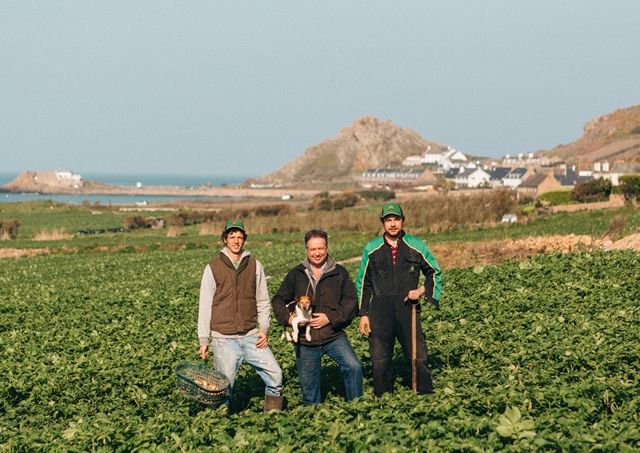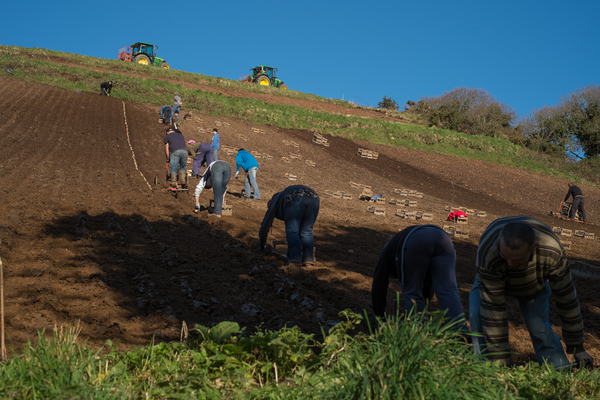

Farmers will have their States funding cut if they fail to meet tougher fertiliser and pesticide regulation standards as part of a bid to cut down nitrates in the Island’s water supply, Minister for the Environment has said.
Deputy Steve Luce told a Scrutiny Panel that members of the agricultural community could be penalised with a cut to their Single Area Payments (SAP) if they do not meet new regulations on fertiliser, which can seep from the soil and into Jersey waters, causing a nitrates build-up – the compound behind the spike in sea lettuce plaguing St Aubin’s Bay.
Part of the issue, he said, was farmers’ liberal use of fertiliser in a bid to ensure maximum crop productivity. “What we have to say is if you grow a crop in a field that has a high value… The temptation therefore is always to make sure that the crop has always got enough fertiliser.”
But now, he said, exact quantities of nutrients and pesticides needed for farming can be accurately predicted thanks to new technology, leaving no excuse not to adapt.

Photo: Minister for the Environment Steve Luce, who appeared yesterday before a Scrutiny Panel.
As such, the Department for the Environment (DoE) are aiming to ensure SAP funding is only allocated to those with LEAF accreditation – a “full food chain compliance and audit process,” monitoring agricultural procedure from field to fork – by 2019.
Those found to be in breach of regulations could see 3% of their payment cut in a first instance, then double this amount, then triple after a third offence.
“[It’s] more of a quid pro quo” arrangement, Deputy Luce summarised, adding that it would help, “deliver environmental good back to the public.”
This won’t be at a detriment to the farmers, however, the Minister argued.
“I believe it can be a win-win situation where they spend less money on fertiliser but don’t have a reduction of output from their land,” he said.

Pictured: Jersey farmers shouldn't see any effect to their crop yields as a result of the new regulations, Deputy Luce said.
Under a 1972 law, 50mg of nitrates are permitted per litre of mains water, but an exemption was made for Jersey Water by Deputy Luce, now allowing up to 65mg.
But Deputy Luce said that concentration of nitrates in the Jersey Water supply did not always hit this upper limit.
Discussion was also given to what the nitrate levels and the resulting ulva (sea lettuce) might mean for Jersey’s reputation.
“Jersey has a quality reputation in all sorts of things – whether our potatoes, countryside or beaches – and the last thing we want is to be at the end of a nitrates story... While the rest of our beaches are very wonderful, St Aubin’s Bay at the height of August is not at the moment.”
Improvements in nitrate levels, and the subsequent beach clean-up, might therefore act as more of a draw for international visitors to the Island, with the value of water recreation to the Jersey economy said to be between 2.8 and 4.4 million annually.

Pictured: Beaches like St Aubin's Bay could be a large draw for overseas visitors if not blighted by nitrate-enriched sea lettuce in the summer months, the Minister told the Panel.
Discussion was also given to public health issues arising from both nitrate consumption and potential toxic fumes arising from sea lettuce - a pertinent topic following the news last week that a French man had died after jogging on a seaweed-heavy beach.
But the Minister said that it was “a struggle to find data [proving nitrates’] detrimental effect on health.”
He added that potential dangers arising from St Aubin’s mass of Ulva could not be compared with those of Northern Brittany, where levels are sometimes over one metre in depth, therefore allowing the, “…opportunity to create gases,” which can rush out if the crust on the seaweed is broken.
Now with a Water Management Plan, and having adopted a productive relationship with farmers and Jersey Water, combined with the fact that, “people are taking more notice of their environment, not only with nitrates, but with pesticides, wildlife and biodiversity”, Deputy Luce said the DoE were “hopeful” for “significant reductions” in nitrate levels in the coming years.
Comments
Comments on this story express the views of the commentator only, not Bailiwick Publishing. We are unable to guarantee the accuracy of any of those comments.